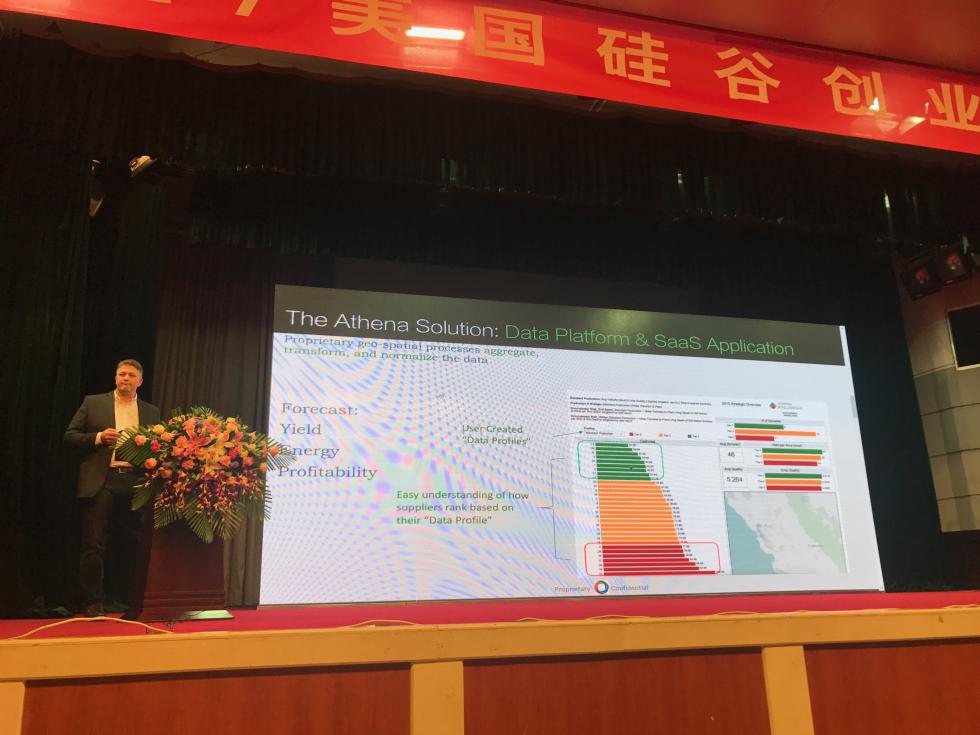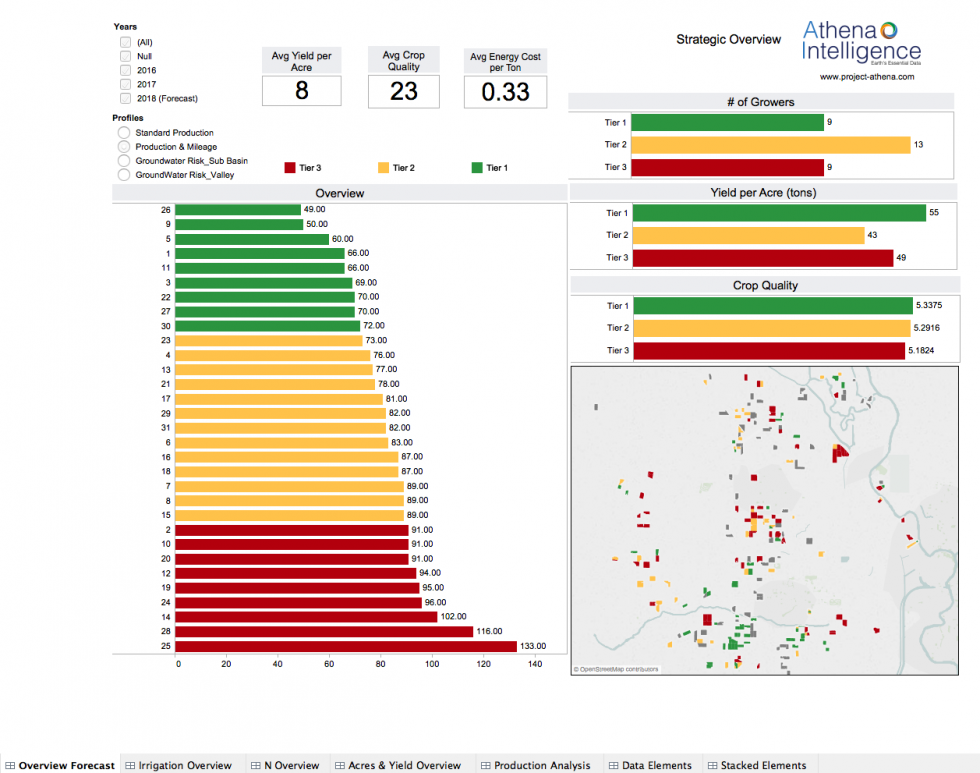For almost a decade, David Sypnieski has been working in the ag-tech space, focusing on the production and processing levels of California’s food system. Six years ago, he noticed a major hole in the supply chain: Food companies and growers didn’t have solid, easy-to-access data to help them evolve with the times.
“If a farmer has questions about water in a given area: ‘How much water is there? Who does it belong to? What is it worth?’” he says. “He should be able to find out by clicking a few buttons.”
But bridging that gap between Silicon Valley and Central Valley was a logistical nightmare. For more than three years, Sypnieski aggregated and integrated public data from various California agencies focused on land, food, water and energy. Different formats made the data hard to organize. Some information was missing or outdated, some had typos.
David Sypnieski presents in Yantai, China in October 2017 during
a week-long investment show. (Photo credit: Seana Day of
MixingBowlHub)

“There are 85 agencies in California measuring 98 different kinds of data, like weather and water flow,” Sypnieski says. “You realize those 85 companies don’t talk to each other, right? They don’t even label their data the same way. It’s a data debacle.”
Originally from Lodi, Sypnieski continued working to fill those holes to make data efficient and accessible for growers and food companies instead of it being disaggregated and scattered across agencies. This is the concept of his startup, Athena Intelligence, a Sacramento-based data processing and visualization platform for the data of land, food, water and energy. Athena offers a predictive analytics and business intelligence application for companies that may be affected by environmental changes (e.g., rising populations, shifting climate patterns), constrained global resources and increased demands for transparency. Analyzing data in advance can help mitigate risks, Sypnieski says.
Related: Startup of the Month: Nominations
Related: Startup of the Month: California Safe Soil
Through the web application, companies can upload and organize their operational data and, with the click of a button, customers can then connect to Athena’s public data ecosystem, which contains data sets such as groundwater and satellite imagery. There, they receive up-to-date reports and analytics on the requested information. The startup also provides data services for companies to customize specific types of data for their business.
An assessment of a crop’s field production, which informs
decision making on contracts and management practices. (Photo
courtesy of Athena Intelligence)

Campbell Soup Company, Athena’s anchor customer, went this route. Campbell wanted to gain insights into how different farming practices, such as irrigation methods, drive both sustainability and farmer benefits. The company came to Athena looking for a tool to feed sustainability insights back to farmers. With Athena’s analytics, Campbell is examining the intersection between soil data, weather information and best practices of farmers, and sharing the results with the farms, according to Daniel Sonke, the company’s director of sustainable agriculture.
He adds, Campbell has already been using the data to give perspective to growers. The company doesn’t reveal a farmer’s data to other farmers, but reports can show how a farm’s water use compares to the average farm use, similar to how a homeowner can track how much water they’re using compared to the average in a given area.
“It’s not meant to be hard and fast scoring,” Sonke says. “We’re not going to quit using a farmer based on this data, but it is a conversation starter on the importance of sustainability.”
A visual representation that predicts the optimal relationship
between desired crop output, types of management practices and
environmental factors such as climate and soil type. (Photo
courtesy of Athena Intelligence)

Other fields can also reap the benefits of the platform and drive strategies, Sypnieski says. The energy industry, conservation groups and financial services companies, for example, can use the application to track patterns, monitor resources and evaluate lending decisions. Athena currently has a pipeline of accounts that includes 15 companies Sypnieski is targeting to secure as customers. The company uses an annual subscription-based revenue model that ranges from $5,000 to $50,000 a year, depending on the size and scale of the business. Data services such as predictive analytics and single-button reporting are available for additional fees.
The team consists of Sypnieski plus three others and a host of interns from UC Davis. Sypnieski bootstrapped the company and is now in the early stages of funding. He’s looking to raise about $1 million from angel investors. This is tricky, he admits, because Athena Intelligence is further along than a seed company, but a little young for a typical Series A investment. But he’s not waiting for funders to move forward because he knows investors respond to momentum, and he believes people need this data now.
“Once you have this data stacked,” he says, “the stuff we’re finding and coming up with, it’s eye-opening.”
Do you know an entrepreneur who has what it takes? Recommend their company for our “Startup of the Month” here.
Recommended For You

Startup of the Month: California Safe Soil
West Sac agtech company turns organic trash into fertile treasure
Daniel Morash doesn’t like to see spoiled food go to waste. In 2012, Morash and his brother, Dave, spent millions to launch California Safe Soil with one goal in mind: convert leftover organic material from supermarkets into a nutrient-rich soil amendment farmers could use to grow crops.




